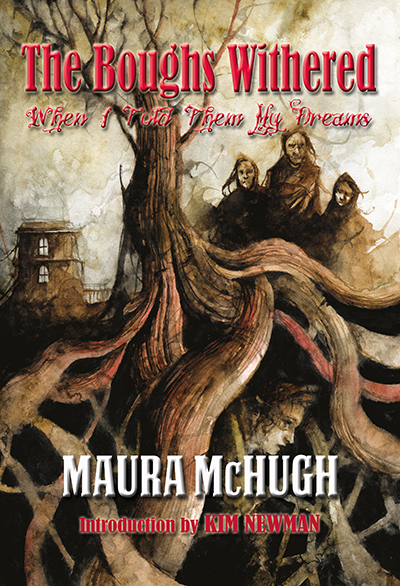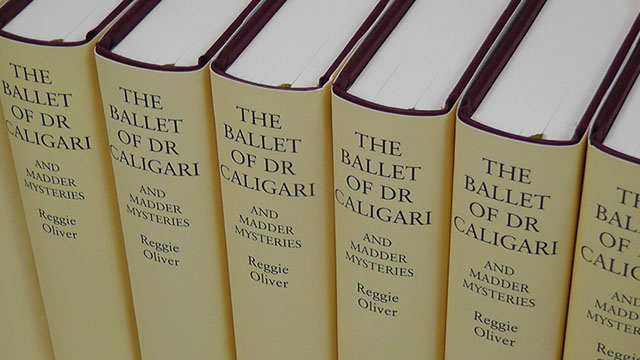A review of The Boughs Withered (When I Told Them My Dreams), by Maura McHugh

Irish short story and comic book writer and critic Maura McHugh has appeared in so many venues, including horror and weird fiction bastion Black Static and prestige anthologies like Joe S. Pulver’s Cassilda’s Song, that it comes as something of a surprise to learn that this is her first story collection. But so it is, spanning some 15 years of work, with 20 dark and weird tales, 4 of them original to this volume. With a title cheekily adapted from a verse of W.B. Yeats, a cover design by the ever-inspiring Daniele Serra, and the usual high production values of NewCon Press, The Boughs Withered (When I Told Them My Dreams) is an attractive enough package on the outside. What’s it like on the inside?
I’m glad to be able to report that The Boughs Withered is refreshingly diverse, varied in tone, diction, setting and even genre niche, and more imaginatively rich and highly coloured than many contemporary debut weird and dark fiction collections. There’s a snap to the dialogue and an engaging narrative pulse best captured in stories like “Spooky Girl” and “The Gift of the Sea.” It’s typical of Maura McHugh’s writing that the latter story manages to marry modern post-GFC Ireland with the spirit of Celtic mythology seamlessly. I don’t know if this is some kind of Flann O’Brien Irish gift to speak in many tongues, but it certainly makes for some highly enjoyable reading. The author commands a whole gamut of styles, and hardly ever leaves you feeling that her wordplay is wasted or overwrought. The settings also range from the Russia of legend to modern New York, with Ireland taking a leading but by no means an exclusive role, and some of that ranging afield has clearly been pivotal to her development as a writer, as she explains in her Afterword. She may write to “intuit the overlooked people who have been silenced,” but this is by no means her only concern. One of her most Irish historical stories, “Home,” is also one where cosmic horror slips into the picture, as it does in “The Diet.” Then again, at least one other story, “The Hanging Tree,” is “almost not supernatural at all” – but still very unsettling.
I don’t know what kind of expectations you might come to this book with, but chances are you’ll find them transcended. There’s infinite enough variety in it to upset anyone’s preconceptions. You’ll be spooked, but you’ll also be thoroughly entertained. That’s a far more important thing than is sometimes realized, and far rarer too. Maura McHugh brings it off in style. The Boughs Withered is a book you’re likely to come back to again and again just for the sheer pleasure of reading it. Now how uncommon, and how important, is that?
A review of The Ballet of Dr Caligari and Madder Mysteries, by Reggie Oliver

Reggie Oliver has become an institution in modern British horror, producing volume after volume of finely crafted stories in the best tradition of weird fiction and ghost stories. Thanks to him, any reader who enjoys tales of this kind has a hugely enlarged bill of fare to sample – this is his eighth collection, containing thirteen stories. It’s produced to the usual superlative standard of Tartarus Press collectible editions, although for anyone who can’t afford the very high, but completely justified, hardback price, there are equally high-quality ebook copies in various formats available from Tartarus, as well as paperback. So how mad, and how mysterious, is it?
A couple of the stories here are straight recreations or completions of the work of M.R. James. “ The Game of Bear ” completes an unfinished story by James in exactly the kind of manner a Jamesian fan could expect, with a suitably ghastly conclusion. “The Devil’s Funeral” is a historical ghost story in the epistolary style mastered by James, concerning an appropriately folklorish local tradition and a haunted clergyman. If you come to Reggie Oliver’s work looking for such pleasures, you’ll find them in plenty. Jamesian antiquarian ghost stories are only part of his range, though. There are other stories here with a strong antiquarian and historical dimension – “A Donkey at the Mysteries,” “The Endless Corridor,” “The Vampyre Trap,” “Lady with a Rose” – but they are mostly either framed in a much more contemporary context, or have a very different take on the narrative. “The Vampyre Trap,” for example, is more of a historical detective mystery than a ghost story, though with a strong gothic dimension. And the historical and scholarly trappings are often more in the spirit of that other great British master of the weird tale, Robert Aickman, with all the appropriately surreal and psychologically ambiguous flavour. “The Ballet of Dr Caligari” itself, with its disturbing evocation of a demonically influential stage piece, or “The Final Stage,” a nightmare dream journey through fragments of identity in masks and mirrors, smack of quintessential Aickman. Reggie Oliver is far beyond just a follower of the Jamesian tradition. He does have many styles and registers, from the genially satirical to the historical pastiche, but of all the dark and weird tales I’ve read, at least one of his stories sticks in my mind as one of the few that has genuinely scared and disturbed me, and in this jaded age, that’s saying something.
The classic English ghost story, then is very much alive in Reggie Oliver’s hands. It’s also far beyond what it appears to be on the surface, even if those surface aspects will be the chief attraction for many readers. A supremely enjoyable volume, from a writer who seems to go from strength to strength.
[Top]